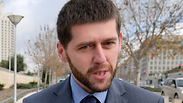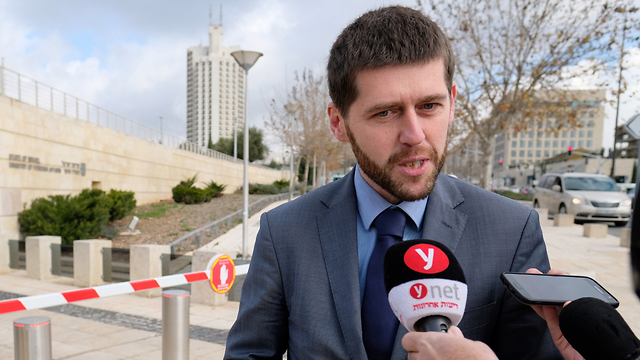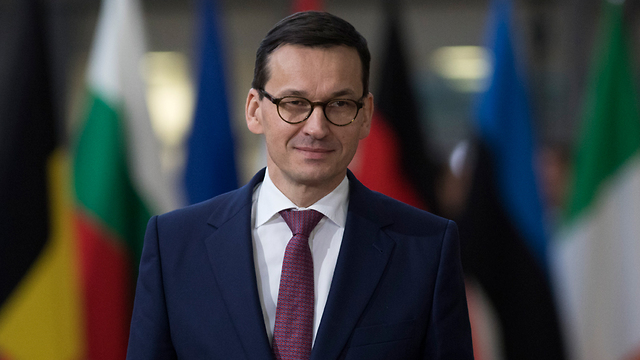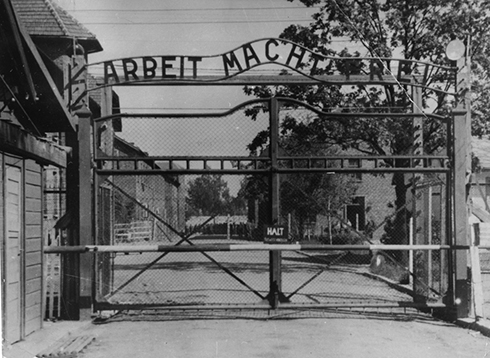
Polish Deputy Ambassador Kozłowski
צילום: יואב דודקביץ'
Polish envoy: 'Bill intends not to whitewash history but to safeguard it'
Deputy Ambassador Kozłowski summoned by Israel's Foreign Ministry for clarification talk in the wake of bill approved by Poland's lower house outlawing ascribing culpability to Poland or Poles for the Holocaust; 'The law's intent is by no means to whitewash history, but to safeguard it and the truth about the Holocaust, as well as to prevent its distortion,' Kozłowski claimed.
Deputy Polish Ambassador to Israel Piotr Kozłowski was summoned for a clarification talk at the Foreign Affairs Ministry in Jerusalem on Sunday morning in the wake of a bill currently being promoted in Poland's parliament levying harsh punishments for attributing culpability to Poland or Poles for the crimes of the Holocaust, which caused ire in Israel.
 Prime Minister Benjamin Netanyahu again commented on the bill's passage Sunday morning during the weekly Cabinet meeting. "We can afford no room for the distortion of truth or Holocaust denial. The bill still has to pass through two more stages, and I voiced our stance that it should be changed," he said.
Prime Minister Benjamin Netanyahu again commented on the bill's passage Sunday morning during the weekly Cabinet meeting. "We can afford no room for the distortion of truth or Holocaust denial. The bill still has to pass through two more stages, and I voiced our stance that it should be changed," he said.
After a 15 minute meeting with European Director Rodica Radian-Gordon and Director of the Department for Jewish Communities Akiva Tor, the Polish deputy ambassador stressed to reporters that "The law's intent is by no means to whitewash history, but to safeguard it and the truth about the Holocaust, as well as to prevent its distortion."
He then added he was given the Israeli government's objections to the bill, as was to be expected.
The draft bill passed in Poland's lower house of parliament, and was transferred for approval by its upper house. It will only enter into law once it is signed by President Andrzej Duda.

Polish Deputy Ambassador Kozlowski said the bill's intent was not to whitewash history but to preserve it (צילום: יואב דודקביץ')
"We will not accept any attempts to change history," the premier declared. "Our ambassador in Warsaw spoke with the prime minister of Poland and made our position crystal clear. The Polish ambassador was similarly called in to the Foreign Affairs Ministry and received the same message. We remember all six million of our brothers."
Poland's Prime Minister Mateusz Morawiecki participated in a ceremony marking the 73rd anniversary of the liberation of Auschwitz Saturday and commented on what he saw as Poland's role in the Holocaust.
"In occupied Poland anyone caught helping Jews was immediately sentenced to death and Polish citizens were executed for trying to defend Jews. That is why Yad Vashem is still missing a special tree for Poland—a Polish tree," he stated.
"Auschwitz is the most bitter lesson on how evil ideologies can lead to hell on earth. Jews, Poles, and all victims should be guardians of the memory of all who were murdered by German Nazis," Morawiecki added later on Twitter.
"Auschwitz-Birkenau is not a Polish name," he argued, "and Arbeit Macht Frei (the sign in German hanging over the entrance gate to Auschwitz, translating to 'Work sets you free'—ed) is not a Polish phrase."
Many in Israel's political system condemned the bill as well. President Reuven Rivlin responded to the bill's passage by quoting former Polish President Aleksander Kwasniewski's May 2000 address to the Knesset.
"One must not falsify history! One must not conceal the truth! Every crime and every roguery should be named and castigated, and circumstances examined and revealed," Rivlin quoted.
Yesh Atid Chairman Yair Lapid, for his part, got into a Twitter feud with the Polish Embassy in Tel Aviv after he posted his strong condemnation of the bill, which he claimed "tries to deny Polish complicity in the Holocaust."
"It was conceived in Germany but hundreds of thousands of Jews were murdered without ever meeting a German soldier. There were Polish death camps and no law can ever change that," Lapid wrote, to which the embassy replied that the intention of the bill "is not to 'whitewash' the past, but to protect the truth against such slander."
"Your unsupportable claims show how badly Holocaust education is needed, even here in Israel," the embassy slammed Lapid.
Culture Minister Miri Regev commented on the bill herself Sunday morning before the Cabinet meeting. "The bill is a mark of disgrace for Polish parliament. We all understand Germans gave the death camps their names, but we also know that the Jews' biggest cemetery lies in Poland, and Jews were burned in death camps there. You cannot rewrite history."













